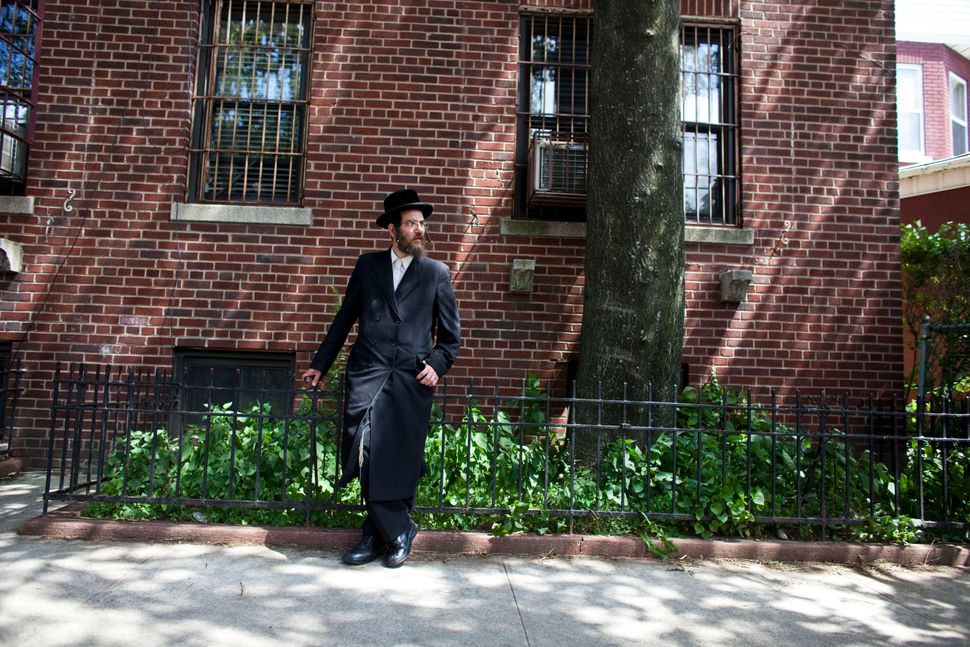Ultra-Orthodox neighborhoods not among hardest-hit by coronavirus: city data

A Hasidic man in Borough Park, Brooklyn. Image by Getty Images
New York City’s Ultra-Orthodox neighborhoods are not among those hardest hit by coronavirus despite the widespread perception that they have higher rates of infection, according to data released Monday by the city’s Department of Health.
The data track cases and deaths across New York City’s roughly 70 ZIP codes from Feb. 29 to May 19. They include one metric that tracks deaths and two metrics that track infections — one that shows the total number of cases in a ZIP code and one that shows the total number of cases per 100,000 people — that’s the “rate” of cases. The rate is the more significant number, because it accounts for the fact that some ZIP codes are more crowded than others, and therefore will likely have higher numbers of infection.
While a Borough Park ZIP code known for a dense Jewish section has the fourth-highest number of infections, for example, that’s in part because it also has a relatively high number of people in total compared to other ZIP codes. When the number is adjusted to account for that, it has only the 27th highest rate of cases.
Similarly, a ZIP code in Crown Heights, a neighborhood that’s home to a Chabad-Lubavitch community, has the 27th highest number of deaths per 100,000 people.
Parts of the city with high concentrations of black, Latino and low-income people, such as west Queens or the northeast part of the Bronx, saw the highest coronavirus death rates in New York. A Brooklyn ZIP code that includes the neighborhood Canarsie-Flatlands, which houses a large public housing complex, had the highest.
“This public health emergency has affected all of our communities,” said Health Commissioner Dr. Oxiris Barbot in a press release. “The data also show that this virus is not hitting New Yorkers equitably.”
Ultra-Orthodox, also called Haredi, neighborhoods drew accusations that their residents were responsible for spreading the virus, based in part on their purportedly higher rates of illness, as ADL CEO Jonathan Greenblatt pointed out in an April 8 opinion piece in the Daily News. He called such accusations anti-Semitic.
However, several high-profile incidents in which Haredi Jews flouted social distancing rules might have also contributed to the perception that they were a factor behind the spread of coronavirus.
For example, the city released the data the same day that the New York Police Department shut down a Brooklyn yeshiva that was teaching 60 children. Police have been involved in similar incidents around funerals and prayer services.
The new data will also likely be cited in the ongoing debate about whether New York City police have targeted Jews for disproportionate or harsh enforcement of social distancing rules, or treated them too leniently.
Some New York Jews have said they feel they are being unfairly scrutinized or generalized about during the outbreak.
Two days after a Hasidic man was issued a ticket for not wearing a mask in Williamsburg, the police department tweeted a photo of an officer politely handing a mask to a woman who wasn’t visibly Jewish. The photo was captioned, “No mask? No problem.”’
However, New York state’s Attorney General, Letitia James, announced on May 13 that she is looking into reports of unequal enforcement of the rules including the targeting of communities of color. Progressive Jewish groups have joined coalitions calling attention to this issue.
The day before, the NYPD had released long-sought data that showed black and Latino New Yorkers account for more than 90% of “COVID-19 related arrests” and more than 81%of the social-distancing enforcement summonses.
Yet New York Mayor Bill de Blasio had to face inquiries about why the police didn’t issue summonses when they shut down the yeshiva on Monday.
Data on enforcement has been released by race but not by police precinct. The latter category might shed light on interactions between haredi New Yorkers and police.




















